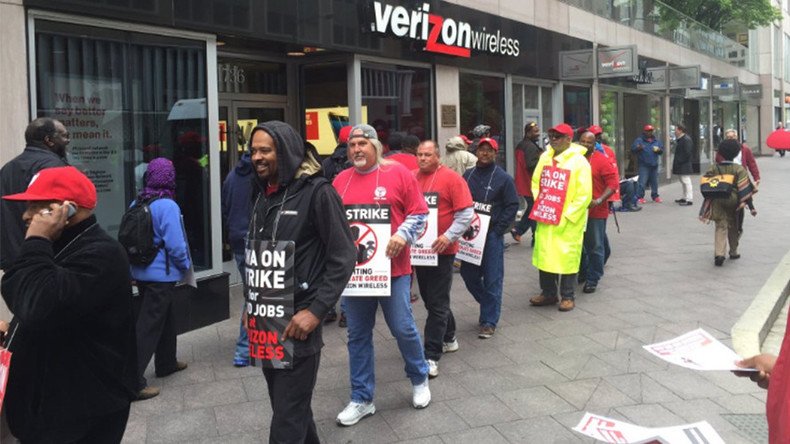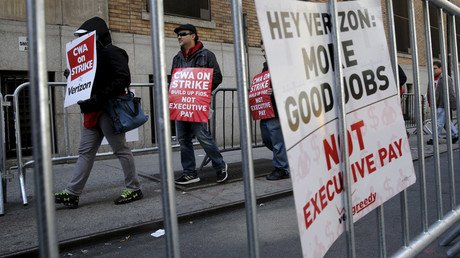Thousands lose health benefits as Verizon strike continues

Verizon workers took to the streets of DC and New York again to protest plans to outsource and offshore their jobs, as their strike enters its fourth week. Verizon has stopped providing healthcare benefits to nearly 40,000 striking workers and their families.
The strike began on April 13, with between 36,000 and 39,000 members of the Communications Workers of America (CWA) participating, the majority of whom work on Verizon’s wireline services along the East Coast. The strikers say that a company making $1.8 billion in profits a month should not be looking to cut back on pensions, benefits, and pay.
“We worked hard, day & night, to keep that network working right,” strikers chanted in front of a Verizon Wireless store in downtown Washington, DC on Thursday. “When it got time to get paid, Verizon turned and walked away.”
Verizon cut health benefits to 110k ppl (workers/families) on 5/1, to force #verizonstrike to end, strikers tell me. pic.twitter.com/UWieB7G7eK
— Nebojsa Malic (@NebojsaMalic) May 5, 2016
On April 30, healthcare benefits for the striking workers – and their families – expired, leaving up to 110,000 people without coverage.
“They think that this is going to be used as a wedge to break this strike. I assure you it will not,” Ed Mooney, vice president of CWA District 2-13, told Reuters.
Verizon made their “last, best final offer” to the strikers on April 28. The proposal includes a 7.5 percent wage increase over the term of the contract, and continued pension benefits up to a 30-year cap. The company also pledged to maintain healthcare coverage “with increases in contributions and some plan design changes that will help in efforts to better manage escalating costs.”
Employees that already have job security will be allowed to keep it, “provided the company gets increased flexibility in managing and deploying the workforce,” the proposal said.
One of the strikers’ principal complaints is that Verizon has been requiring technicians to “work away from home for as long as two months.”
“It’s unfortunate that union leaders have denounced our proposal,” said Marc Reed, Verizon’s chief administrative officer. “We’ve given the unions a great offer. Their reaction to our offer does nothing to benefit our employees who are not where they should be – back at work and serving our customers.”
The union says Verizon’s proposal fails to meet any of their demands, and ensures that the good-paying, middle-class jobs will be outsourced or contracted out.
Instead of investing in expanding fiber-optic service, Verizon is “redlining entire cities like Baltimore and Buffalo” and spending billions on stock buybacks, Peter Sikora, strike coordinator for the CWA, told RT America.
The strikers have received encouragement from Democratic presidential candidates, with Hillary Clinton expressing support and Bernie Sanders actually visiting a New York picket line in April. On the Republican side, Donald Trump has also taken a stand against outsourcing, but has stopped short of backing the union.
“His opposition to the TPP is a great thing and his rhetoric on jobs and bringing them back is wonderful, but all we’ve seen so far is rhetoric,” Sikora told RT, in commenting on Trump. “He’s welcome to join the picket line, we’d love for him to come, but he hasn’t done so yet.”













